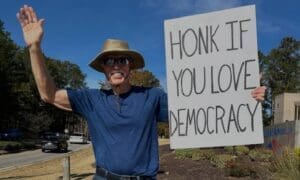A disagreement over City Council budgeting tactics now has Mayor Don Haddix on the offensive against fellow Councilman Eric Imker. In a letter to the editor in the July 20 edition, Haddix chides Imker for promising to avoid property tax increases when he ran for election in 2009, only to vote for a property tax increase in 2010.
Haddix also criticized Imker’s reasoning for supporting the tax increase, namely that the proposed $2 million in cuts that he devised weren’t approved by the rest of City Council.
“Imker never had $2 million because many of his items were not legal, feasible or doable such as parking meters at the library,” Haddix wrote. “We would have continued the 2010 budget and been forced to do adjustments, without any tax increase.”
Haddix last year favored a smaller tax increase of .5 mills as opposed to the 1.25 mills that was approved on a 3-2 vote of council, with Imker breaking a virtual tie between the two sides.
“He blamed the rest of Council for not backing his cuts due to lack of courage, guts and backbone, an accusation he repeated at the July 11 budget workshop …” Haddix wrote.
Haddix also says Imker’s budget recommendations include no tax increases this year, but features some in future years. Imker has said previously that the city can reduce or eliminate those tax increases, much as it has done for this budget cycle.
Instead of enacting a property tax increase this year, the city is poised to get by with less property tax revenues than last year due to loss of property values.
The mayor also criticized Imker’s supposition that the city is on track to have a sustainable budget within the next several years.
“This is semantics and spreadsheet smoke and mirrors,” Haddix wrote. “Reducing contingency fund line item numbers makes the books look better during an election year but does not reduce the amount ultimately spent by one penny.”
“… Using Imker’s projections in 2017, we will still be spending more than we take in after draining the reserves and three more tax increases,” Haddix continued. “Taking out the smoke and mirrors entries makes it even worse. That is not a sustainable budget and does not address the real issue of spending more than we take in.”
Haddix said he thinks the city should avoid spending down its cash reserves as projected in fiscal years 2013 through 2016. Instead, Haddix advocates prioritizing “essential services and maintenance” in addition to adopting fees and fee increases for non-essential services.
Haddix wrote that he also favors streamlining of city operations and the use of public/private partnerships.
The city currently has cash reserves equivalent to 37 percent of its annual budget, and starting in 2013 that amount will be spent down until it equals 20 percent of the city’s budget.
That is after the city is projected to end this budget year by adding nearly $1.6 million into cash reserves, and a projection to add some $831,000 to the reserves over the 2011-2012 fiscal year.
Imker and Haddix clashed over the budget at the July 11 City Council budget workshop, arguing in raised voices, and Imker at one point put a large binder over his head, accusing Haddix of failing to look at the impact this year’s budget would have in future years.
Imker has proposed some $407,000 in cuts to the 2011-2012 proposed budget which council has under consideration and is expected to vote on at its Aug. 4 meeting.
Haddix has contended that he wants to understand what the cuts are for, particularly the impact on services.
The budget will be discussed at a public hearing at Thursday night’s council meeting, which starts at 7 p.m. at City Hall.
In his letter, Haddix again said he wants the city to fund the Development Authority of Peachtree City in an effort to attract businesses here. Last year the council on a 3-2 vote cut the entirety of funding for DAPC from its 2010-2011 budget, instead favoring the adoption of a system that gave the city a full-time paid staffer to handle the same role: an economic development coordinator.
Haddix contends the coordinator would focus on attracting retail jobs instead of the higher-paid jobs needed to bring residents to the city along with additional disposable income.
“We need our development authority funded with their own development director because they do have the legal ability and powers an EDC does not,” Haddix wrote.
Haddix said that Imker’s contention that the Fayette County Development Authority works to proactively recruit businesses here is false. Instead, FCDA works only with leads that are brought to it, Haddix note.
Haddix also got in a jab at former city Economic Development Coordinator Joey Grisham, to whom Haddix attributed comments that the city needed big box retail stores, and also that the city’s village concept was not viable, leading the city to need a centralized shopping district.
Grisham resigned shortly after it was revealed that Mayor Haddix’s wife Cathy was critical of his support for big box stores, as she expressed that she hoped Grisham’s tenure would be short-lived.
Based on that news, Haddix said that some people have asked his wife to run for city council, “which is legal and will irritate those who tried to make hay of the incident by being 180 degrees from the effect they desired.”











Leave a Comment
You must be logged in to post a comment.